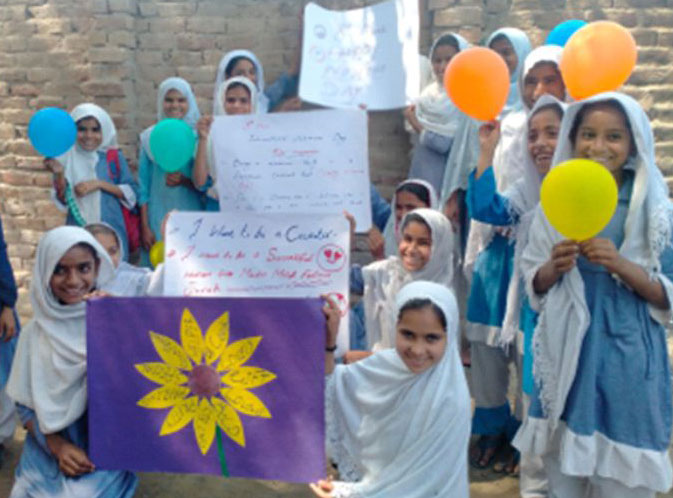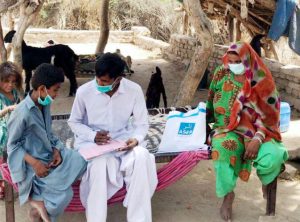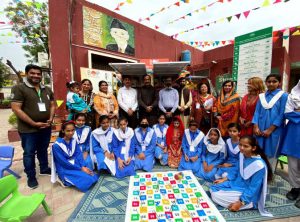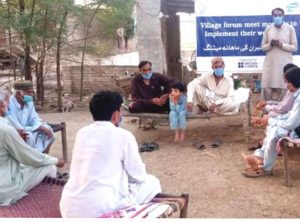
Recovery for Foundational Learning
Flood Response Sindh 2022-23
October 2022-October 2023
Supported by Sindh Education & Literacy Department (SELD), Funded by the Foreign Commonwealth & Development Office (FCDO) & Implemented by Idara-e-Taleem-o-Aagahi (ITA)
During times of crises and emergencies, uninterrupted access to quality education and continuity of learning is the right of every child. Committed firmly to this premise, Idara-e-Taleem-o-Aagahi (ITA) collaborated with the School Education & Literacy Department (SELD) Government of Sindh with generous and timely support from the Foreign Commonwealth & Development Office (FCDO) to address the learning emergency in Sindh. For the floods’ emergency, a yearlong project Recovery for Foundational Learning: Flood Response in Sindh, ITA boldly proposed three interventions in the flood affected districts of Shikarpur & Ghotki in upper Sindh to ensure, no child is left behind in the 391 target affected schools of SELD.
The interventions proposed were both traditional and non-traditional covering both the relief and recovery phases of the emergency. The project had three intervention arms with complementary objectives of: i) stabilizing schools and children (girls and boys) enrolled to attend schools and learn in dignity; ii) recovering the persist by addressing the foundational learning gaps in basic schooling up to grade 5; and iii) enrolment/mainstreaming of out of school children supported by the Teaching at the Right Level (TARL) chalo parho barho learning camps in flood affected communities.
Relief Phase – Intervention I: consisted of the distribution of Back-to-School kits for 65,000 school-going children/adolescents; 10,000 reusable menstrual dignity kits to female adolescent students and teachers; 800 School Stabilization Kits with teaching learning materials (TLMs), ECE, libraries, TLMs and sports kits; and 4000 Health and Hygiene Kits. Overall, intervention I reached more than 210,000 beneficiaries in 800 affected schools of Sindh (finalized by SELD & SEF). Among these beneficiaries, 65,000 children (34% girls) from 391 schools received Back-to-School and 10,000 MGM/Dignity kits, whereas 89% of 30,874 children not only received the kits but also received intervention II i.e., “Chalo Parho Barho”/Teaching at the Right Level (TaRL) 60 days learning camps; 43% of TARL beneficiaries were girls. The aim of the project was to reach a high number of girls through all its intervention arms which proved to be a challenge given their low enrolment prior to the project rollout.
Recovery Phase – Intervention II: involved setting up of 60-day Teaching at the Right Level (TaRL)-based learning camps in flood-affected schools to address the learning gaps of 30,000 primary-level children from grades 3-5. The in-school children were at risk of dropping out with more than 90% at beginner learning level in basic literacy and numeracy. Given that the academic year was to end in May 2023, the focus was to prioritize a very high number of in-school at-risk children (89-90%) who would drop out with very poor learning baselines, whereas the share of out of school children of ages 6-13 was 11% (3476). The “Recovery for Foundational Learning” program is unique as it focuses on a systematic approach for learning gains/recovery and remedial within learning poverty and/or emergency settings. Furthermore, for a system embedded intervention it was important to have TARL or “Chalo Parho Barho” (Let’s Read and Grow) learning materials, teacher guides, workbooks and assessment tools fully approved by the provincial Directorate of Curriculum Assessment and Research (DCAR). The approval was fast tracked by SELD through DCAR to ensure that in January 2023 the TARL Camps could begin in an uninterrupted manner to reach the target of 30,000 children by end September 2023.
The 60-day camps were rolled out in 4 cohorts (with 2 groups within each cohort) from January to September 2023, continuing even during the summer break with a formal permission from SELD.
Within the camps, the children were grouped according to their learning levels as per the TaRL instructional approach. The accelerated camps facilitated student learning through structured and interactive activities to improve reading, writing, listening, speaking and practice in the three core subjects of Arithmetic, Sindhi and English. More than 500 teachers and cluster coordinators were provided a five-day training followed by on-site support in the learning camps. The learning levels were assessed at periodic intervals i.e., at baseline, midline (after 30 days) and at endline (after 60 days) for keeping track of learning improvements.
Assessment Results from TaRL-based Learning camps: The assessment results from TaRL-based learning camps set up under intervention III show remarkable improvement in learning levels across all 4 cohorts and the 3 subjects i.e., Sindhi, Arithmetic. and English.
Learning assessment results show substantial improvement in Sindhi learning levels for children who attended the 60-day TaRL-based learning camp cycle across the 4 cohorts. At endline, 47% could read a story in Sindhi compared to only 3% at the baseline.
For basic arithmetic learning levels also indicated a promising improvement. At endline 44% children can do a two-digit division as compared to only 3% at the baseline. English learning levels also indicated significant progress; 63% children could read a sentence in English at the endline as compared to only 2% at the baseline.
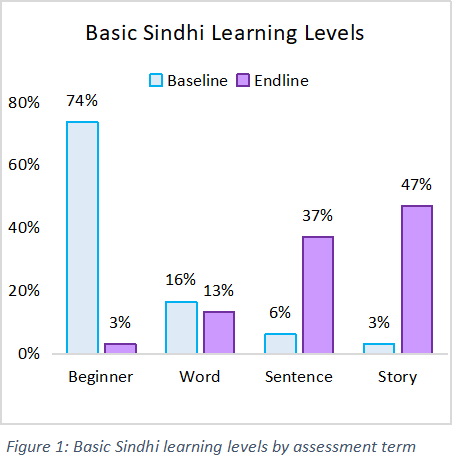
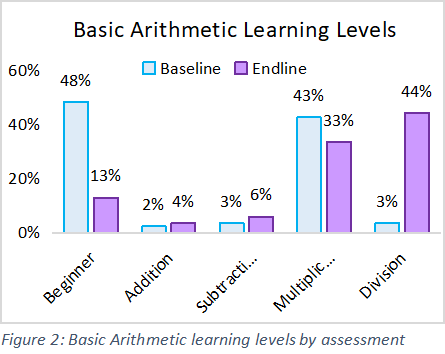
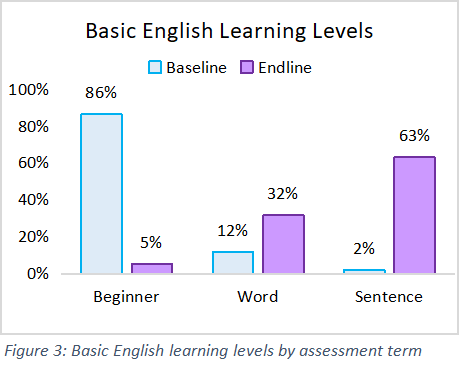
“All Children Enrolled & Learning” Intervention III: titled “Every Child Counts, Every Household Matters!” consisted of two target villages of Mehmood Panhwar in Shikarpur district and Moomal Ji Marri in Ghotki district, where household census was conducted using ASER tools to record the enrolment status of children as well as to assess the basic learning levels of children (ages 5-16 years). Based on the census findings, children who were out of school were identified along with poor foundational learning levels. These children were (ages 6-13 years) were then enrolled into the 60-day TaRL-based learning camps. Upon completion of the camps they were mainstreamed on merit in the area government schools. This was successfully achieved for both villages. ITA is keen to extend the intervention at the cluster or Union Council level to have a community-based approach for “All Children in School and Learning”.
The enrollment level in the 391 schools increased by 12 (i.e., 7526 children according to the provisional number provided by district SELD offices in June 2023. Updated disaggregated gender wise data is awaited by 28th October 2023) on account of the interventions. In the 391 schools, no other SELD partner was providing support as per SELD-ITA agreement.
Equity & Inclusion Addressed: A total of 225 children with disabilities; 1359 minority children and 29 children with child marriage were reached and supported. A survey has been conducted on CWDs using the Washington Short Set of questions for disability assessment.
Evidence Based Advocacy for Education & Learning in Emergencies & Climate Change Emergencies: The Project successfully advocated to ensure that the intervention on Learning in Emergencies was integrated in the Dashboard of Education Sector Working Group (ESWG) in Emergencies, coordinated by UNICEF and the provincial DRR group, and as an indicator on Learning Outcomes (SDG 4.1.1 a). Furthermore, the project engaged in evidence-based advocacy efforts during the Recovery Phase through the SELD hosted national conference on “Foundational Learning and Early Childhood Care & Education in Emergencies” (July 11-12, 2023) and the Conference Call to Action.
Furthermore, the early findings of the study “Foundational Learning in Emergencies” were presented by ITA’s Program Coordinator at the UKFIET Conference at Oxford September 12th-14th, 2023 and was well received by the international forum.
Each of the 64,334 children carried their unique IDs generated by the project as beneficiaries of the interventions.
Multiple tools were developed for program support, monitoring, evaluation and research purposes which are a contribution to the community working on Education in Emergencies in Pakistan. These included: the School Verification Forms; School Accountability Card (for Relief Kits); TARL/ASER-& I-CAN Baseline/Midline/Endline tools; Social Emotional Learning Measurement Survey; Disability Survey Tool using Washington Child Functioning Module -Short Set
The TARL/CPB materials finalized and notified with NOC in technical consultation with DCAR-SELD

